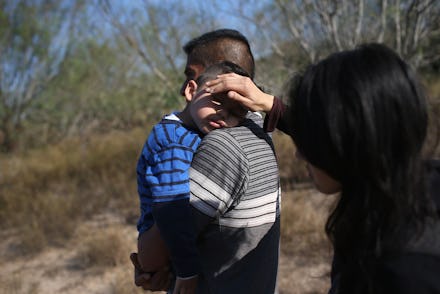About half of undocumented immigrant kids under 5 will be reunited with parents by deadline

Two weeks have passed since President Donald Trump signed an executive order to end his administration’s policy of separating undocumented immigrant children and parents, but chaos still reigns at the border and across the country as family reunification has hit roadblocks.
On Monday, government officials were due back in court for a hearing after court filings showed that they had requested an extension to the July 10 deadline originally handed down for reuniting the children under 5 who had been forcibly separated from their parents while entering the country.
During Monday’s court proceedings, government officials said that about half of the children in the under 5 age group — just over 50 — would be reunited by the deadline. A second hearing to monitor the reunification process was scheduled for Tuesday.
Back in June, U.S. District Court Judge Dana Sabraw issued a preliminary injunction on the practice of family separation, and also stipulated that the remaining children aged 5 and over must be reunited by July 26. Despite Health and Human Services Secretary Alex Azar’s assurances that the government was on track to meet the dates laid out in the ruling, subsequent court filings showed that the Trump administration was seeking to push the deadline back. The administration cited difficulties locating dozens of the youngest children’s parents, including at least 19 who had already undergone deportation proceedings.
The lead-up to the Monday court appointment indicated the duress the Trump administration is now under in trying to swiftly reunite the families it has separated — and just how messy the situation has gotten.
In March, the American Civil Liberties Union filed a federal lawsuit challenging the Trump administration’s separation of an asylum-seeking mother and her 7-year-old daughter. Both had arrived in the U.S. after fleeing violence in the Democratic Republic of Congo.
Attorney General Jeff Sessions announced the White House’s planned crackdown on immigration on May 7 — warning would-be immigrants that “If you cross the border unlawfully, then we will prosecute you... If you are smuggling a child, then we will prosecute you. And that child may be separated from you, as required by law.” Afterwards, the ACLU expanded its suit on behalf of the other parents and children the government planned to imminently separate.
On June 26 — just days after Trump had signed an executive order terminating the policy — Sabraw ruled in the ACLU’s favor, officially triggering the beginning of the reunification process. But as government employees would soon realize, they had their work cut out for them.
As the family separation process got underway, the obstacles that the government was setting up for itself became evident. Unaccompanied children, some as young as 1 year old, have been kept in large chain link cages, and in some cases, forced to represent themselves in court. Meanwhile, some separated children have been entered into an Obama-era foster care system, where temporary guardians described them as “shell-shocked.”
The distance between many children and their parent or parents have been coupled with logistical challenges and resulted in a major bureaucratic snag. Officials are now complaining that the immediacy of the deadline is not realistic given the stringent vetting process necessary to ensure that all of the children in government custody are returned to the proper caretakers.
During a separate hearing on Friday, just after officials filed the paperwork requesting more time for reunification, federal lawyers said that the government had only located parents or guardians for about half of the 101 children in the 5 and under age group. They also note that DNA swabs are being utilized in order to quickly place the minors.
As the government awaits the court’s Monday decision on whether or not the timeline for family reunification will be extended, time is of the essence: doctors have repeatedly warned that being separated from parents for even short periods of time can cause symptoms of toxic stress in children, which can derail healthy emotional development.
Lee Gelernt, deputy director of the ACLU’s Immigrants’ Rights Project and the lead lawyer who argued for the preliminary injunction, said in a July 8 press release that the request for more time was unacceptable given the levels of trauma the children have already been subjected to.
“The judge made it very clear he wasn’t going to allow the Trump administration to drag its feet on reunifying these children with their parents,” Gelernt said. “We oppose the administration’s efforts to further prolong the suffering of these families.”